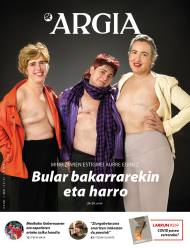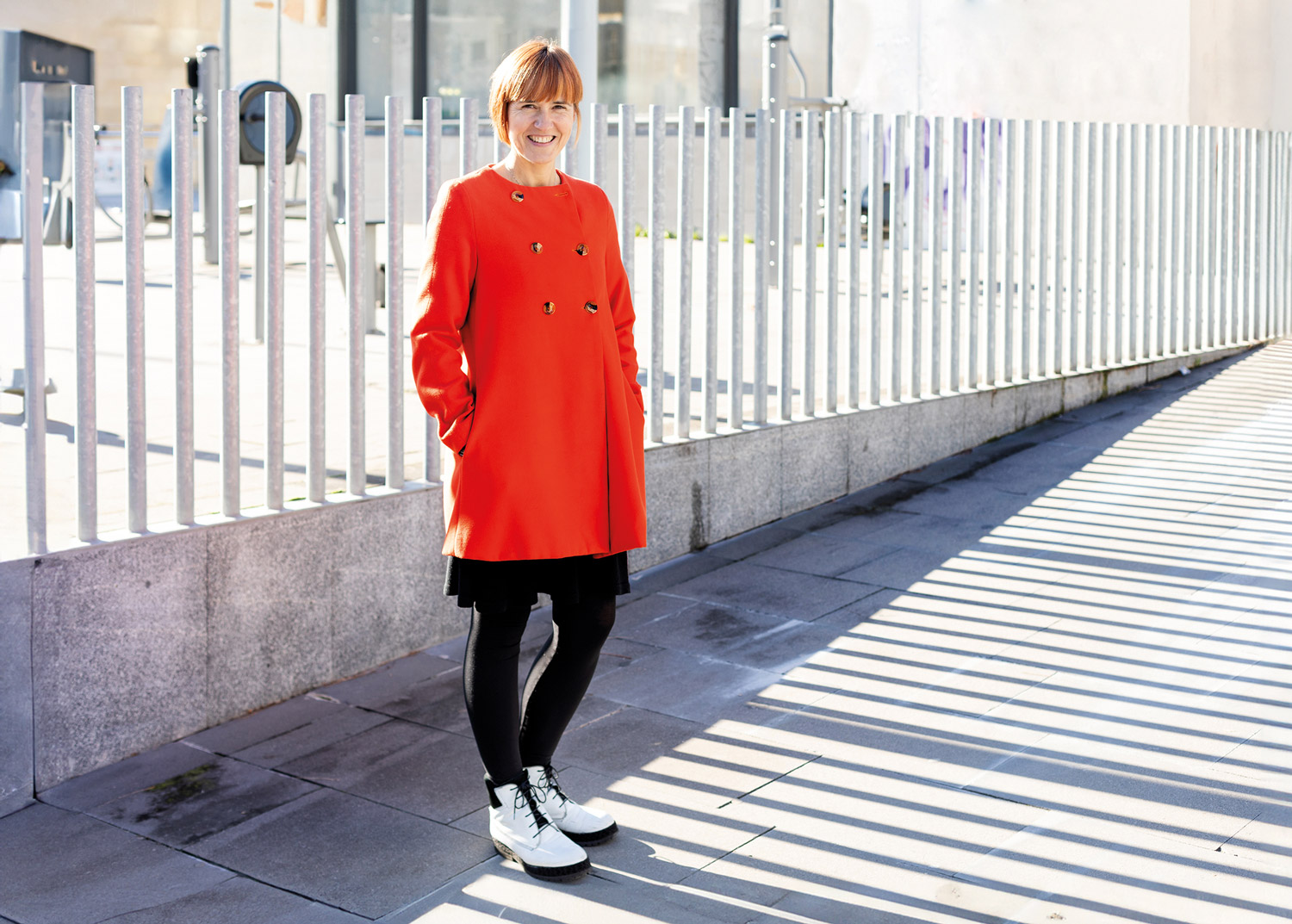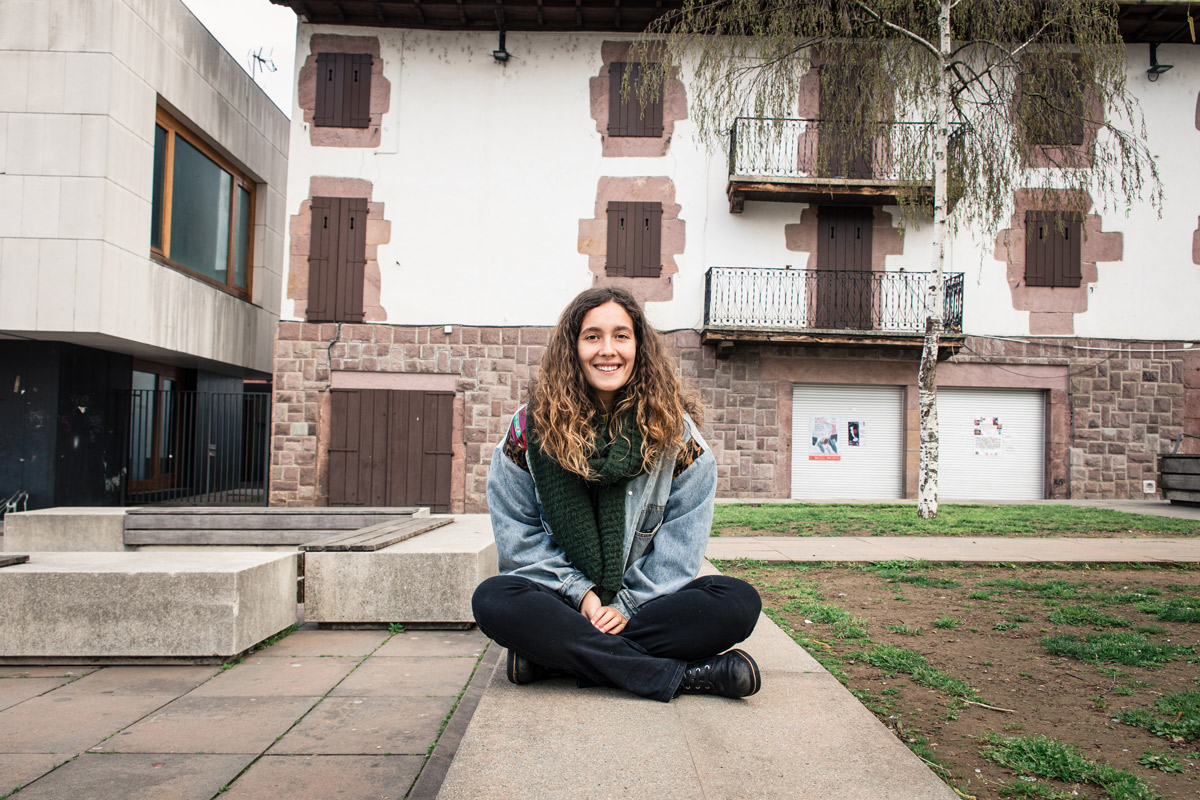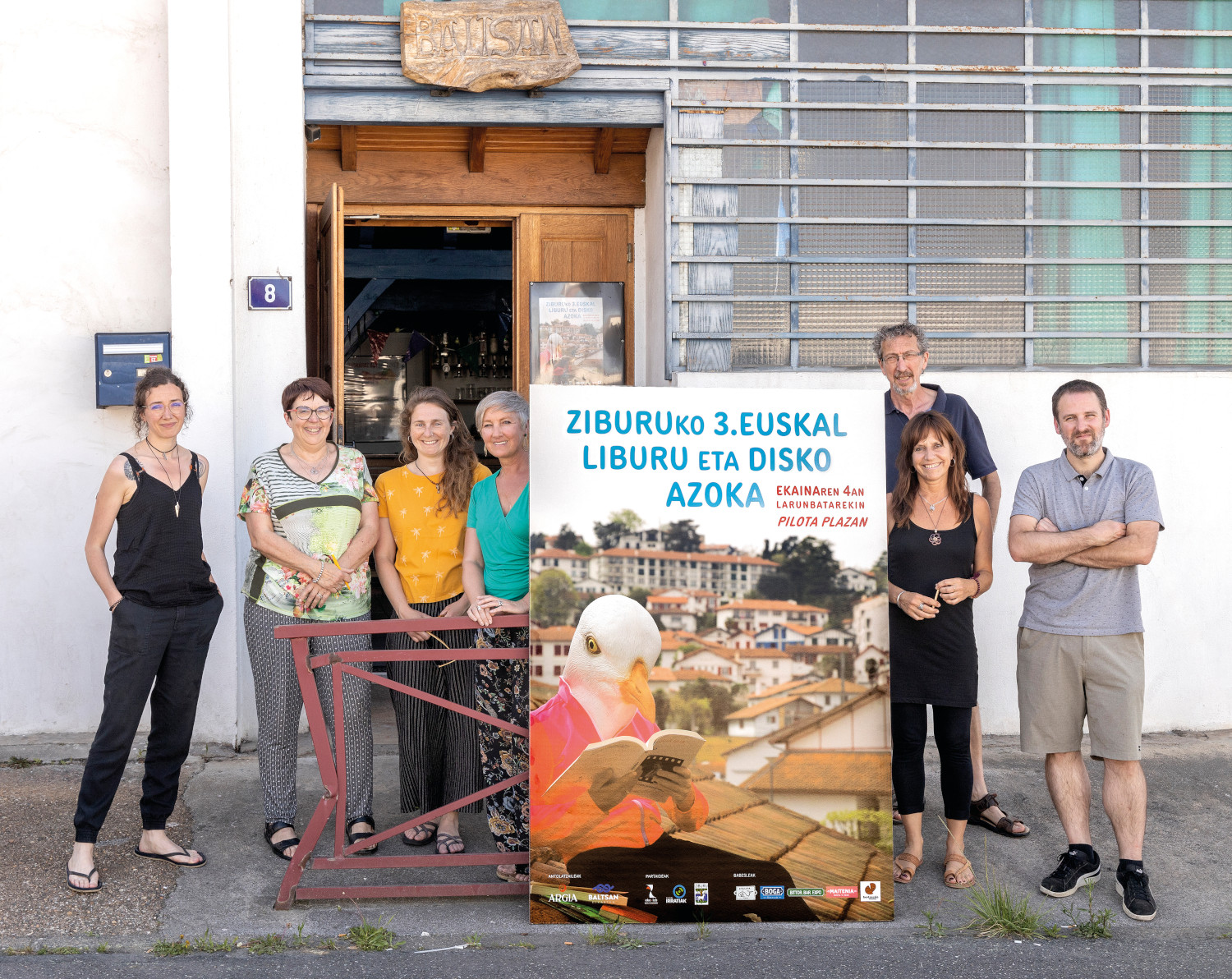"Stories give you a lesson without wishing to give lessons"
- Stories of ancient tradition, brought from outside, heard and read here and there, are mostly those that the young baztanese Ameli of Amaia Elizagoia stitches to the present reality, with words and music.

Bertsolaria izan da gaztetatik eta ipuin-kontalari profesionala duela sei urtetik. Txikitatik ahozko transmisioarekin harreman estua izan du. Amak ipuinen mundua erakutsi zion. Aita Bittor Elizagoien du, bi aldiz Nafarroako txapelduna izandako bertsolaria eta ipuin eta istorio zaharren zalea. Haur Hezkuntzako goi maila eta gradua ikasi zituen.
“Ameli, ipuinen jostune” da bere izen artistikoa eta azkenaldi honetan ipuin kontaketa musikatuak egiten ditu Irati Celestino musikariak lagunduta.
Baztan-Bidasoa Turismo Elkarteak plazaratutako Oihanean sentitu. Bideak bertze ipuin liburuko narrazioen egilea da.
Where has your hobby come from to tell stories?
I believe that my attachment to the Basque Country and to the Basque culture has largely been given to me by my father and people. I remember that my father asked us many times in verses to gather the table and that my sister taped her ears: “Enough, there are no more bertsos!” as I said. On the other hand, I would say that the culture of stories is also that of the mother, because she read many stories to me that she was little.
When I was a kid, I was the youngest in Bertsos school, right?
Yes. I remember being called the bertsos school pet. Estitxu Arozena reminds me many times that the first day I started singing to my friends and at one point I made him angry: “But what have I come here to be a pot? I also want to sing!” I've always had that desire to know what it feels like to put myself in front of the audience.
When and how did you start telling stories?
Six years ago, I started professionally. I really like this trade. A privilege is to be able to live from the narrative in Euskal Herria.
In my childhood and adolescence, I wanted to be a journalist, because communication is very important to me. Then, on the other hand, I thought I wanted to be a nurse, in the belief that being with the patients and giving joy and affection would be great. I am very affectionate in the spaces where there is room for it; I would say that the Basques in general have a colder form of relacionarnos.Sin however, life led me to study the degree of Early Childhood Education and then I realized what I like teaching. We had the story count as a subject, and that's where I started delving into it.
He has also worked as a journalist in Xaloa telebista. What experience has there been?
I think I have a special link with communication and I have always been a good listener. I love asking questions, because the answers show you other ways to look at the world.
.jpg)
"We want to sew into today's reality the ideas, the people and all those stories that have been left in the shadow. We want to make that relationship with the public.”
What do you want to get?
My goal as a storyteller has always been to convey the work that our ancients have done, but to adapt it to today's society.
The figure on the counter is the figure on the bridge. Our mission is to bridge the gap between heritage and the public.
What is special about Basque culture?
I think it also has pain, compromise and nostalgia. I find the association of these elements very interesting. Although the Basques are not very spiritual, we have a special and close relationship with nature, which I very much like.
The Basque culture is generally thought to be very classical, but I think it is much more than that, and we must firmly believe this if we are to promote the creation and consumption of culture.
Another characteristic of the Basque culture has been the strength of orality and the idea of collectivity that it generates. In a globalized world moving towards individualism, the footprint of this collectivity is still strong between nosotros.Esto I see it clearer, for example, when I am out of here. Young people do not have much habit of talking about social problems or of working collectively. And that's what we have here, maybe not as much as we would like, but we have it and we have to keep it.
What about Euskera?
The Basque Country is indispensable. I live in Basque and know that I am a privileged person, but at the same time it seems to me that privilege can be created in part by myself. That speaking in Basque is something we can choose. In this sense, we have to do a job and see that it is inevitable that we inhabit the world in Euskera, so that others can do it in the future. I think it is worrying to see that we are broadcasting the language, but perhaps not adherence to the language, and the Basque without it does not make sense. If you just look at practicality, it's over.
What are your sources of inspiration?
Aunitz To start with, our old legends. When I was doing interviews at Xaloa Telebista, I was asking older people about legends, and I've read a lot of stories that are gathered here and there, because there's a very interesting treasure there. In addition to this, I also take stories of children's literature and other cultures: China, South America or Arab culture, among others. If I like an external story, what I do is fix it and bring it to us. In this way, I try to enrich the child imaginary of the Basque Country. There will be a story in the village of Ligi, another in Cintruénigo and another in Lekeitio, for example.
And you invent stories?
I do, but I believe less and less in originality. I think a good piece is a good recycling, because it all emerges in this world. I am not committed to that. On many occasions, we tend to go blind in search of the news, without looking back and without seeing or learning what's there.
Sustainability is a special feature of stories. The story of the blacksmith, for example, is over 6,000 years old. It is one of the oldest stories known as the Bronze Age. I think it is very important that we continue to tell this so that we can then count on others.
Stories have a force that can be more intuitive than verbal. They give you a lesson with no desire to teach a lesson, and that's their strength. In the end, through the story you experience a collective experience that can touch you in one way or another. Sometimes it will happen very smoothly and sometimes it will turn you on and you will also feel the need to tell it. This is very primary, that is, the need to communicate. I want to take stories that touch me, transmit them after I do. That is my job and in order to achieve it it is essential to consume the art of others.
Many times it seems to me that we want to create things without consuming or knowing what other creators have created.
Most storytellers are women. Why?
I think it is very much linked to two things: first, in Euskal Herria, culture and so many other things, like language, are largely alive thanks to women. On the one hand, women have had a strong tendency to care and have also cared for the transmission of culture. On the other hand, today is a shadowy storytelling trade, because I often have to remind people that I live from this, which is my trade. You always work with a few public and perhaps men have a greater tendency to more prestigious trades.
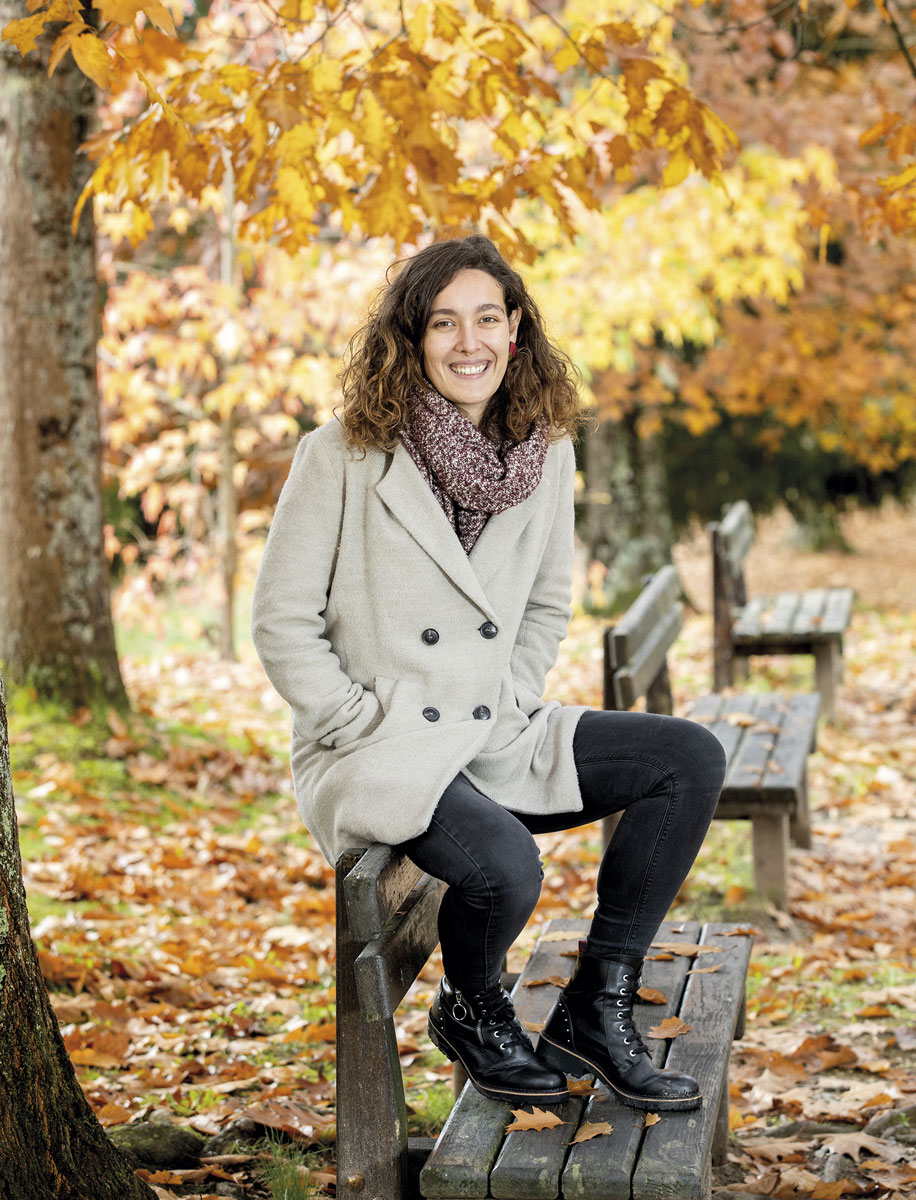
"I believe less and less in originality. I think a good piece is a good recycling, because it all emerges in this world. I don't care about it."
What do you think of putting children in recorded stories during sleep?
It's not ideal, but I understand that my parents are tired and I'd rather put a story to listen to than a video, because the light on the screen doesn't help the child sleep. Along with this, we have to be very clear about what we put the child in, if it's a story, if it's a message of values -- it's very important to see what we're going to put the child first.
Should stories always be didactic?
No. Not at all. It will always have some didactic value. For example, from the linguistic point of view, they will always serve us to enrich the vocabulary of the child, but there are also absurd stories, without lessons, or books that serve to play, such as those that collect the buccal knots.
From the Basque community we have to work hard to create a good, educational and attractive material. It exists today, but we need to create more. Of course, you don't have to close external things, but we have to work a more conscious way to consume. Make conscious choices and don't take the waves.
What are the sessions you do with adolescents in schools?
I like to tell stories in high schools. First of all, I explain to you why I've chosen these stories that I have to tell. In many cases they are hard, raw and interesting because they are part of the world and of reality. Some have an autobiographical basis and I explain that I have made a great effort to go to the past and see what existential doubts I had at that time. It's fun and touching to see that we all have similar fears and joys.
And what does it tell adults?
Now we have three works. Letters, adaptation of the stories I have received about the deaths, Women of the world and the third in the environment of Lourdes Iriondo. With the latter, our goal was to make the great artist known. Our generation knows Xabier Lete and Mikel Laboa, but not Lourdes Iriondo, and only sixteen years have passed since his death. They called him Juan Baez of the Basque Country, but yet they have made him invisible, like many other women. Her work is closely related to vasquity and when I met her I felt pain and need to be made known.
How did she start with her friend Irati Celestino?
We met four years ago. At that time I worked with the singer-songwriter of Oronoz Olaia Intziarte and I took the path to be a professional, but she, on the one hand, was very young and, on the other, had other dreams. A friend Irati Celestinoz spoke to me. I knew him from the eye and, although they were very different, we stayed to chat and when I told him the project he got excited like nobody else. I'm a very intuitive person, and soon I saw that I was going to go OK.
What are the reindeer you want to sew? We want
to sew to the present reality the ideas, the people and all those stories that have been left in the shadow. We want to make that relationship with the public.
You are studying theatre in Barcelona. How about that?
All right. I'm in lab school. In Chile, it has its origin and they have a very special way of understanding art, which I really like. I think storytelling and theater are very different, but it's very interesting to learn from other genres. In addition, I see more and more clearly how important it is to get out of here and out of this comfort space. The Basque Country sometimes devours you. Baztan, for example, I love it, but sometimes I find it very suffocating. Here we all know each other and by my trade I am a public character in some way, and I really like to create another Amaia out of here or back from scratch in another space.
What do you think about the future?
One of my dreams is to learn with Koldo Amsoy. It is a very special reference point. And I've realized that I also love writing. With the Tourist office here we have made a book of stories and I have learned a lot with the process. Now with the illustrator who was in that project, Juan Angel Perotxena, I have other projects to do illustrated stories. I intend to keep learning and creating.
Do you intend to return to Bertsolarism?
I had a great time on the tarima and my friends told me that getting up to her would increase, but I realized that if I didn't spend the time I needed I didn't enjoy. I'd like in the future to have a space to go to bertsos school, because the bertsos school and the bertsos family is one of the most beautiful things Bertsolarism has.
"This Navarre Bertsolarism Txapela will bring more women to the end of the coming years and, at the same time, it has been a beautiful attempt to empower all people living on the margin"
How does Bertsolaris see today?
I do not believe that there is any theatre, that is, when you put a subject on and do not specify to bertsolari the position it should occupy, you do not normally put it on the skin of people who think otherwise.
Given that in the championships, above all, there is not much room for singing freely, we want to take advantage of those few that are there to give your opinion. It would be interesting to take on roles that don't come with us, because that would create them, perhaps not many applause, but very interesting reflections after the session, because bertsolari has a lot of capacity to reflect. And I think we're missing. We have a lot of tendency to go to precisism.
What did you think of the result of this year’s Navarra championship?It
was a high-level championship. Also the final, but I think it has not been a reflection of the reality of Bertsolarism in Navarre. Only one woman has arrived and many have been left out with a high standard. On the other hand, it is a source of satisfaction to see that many young people are wanting to sing and that many of them are leaving the less vascophony area to the plaza. From here I am convinced that the finals will be much more varied, that they will be richer and that the speeches will be gradually extended. Saioa Alkaiza held a round session and brought the much-deserved txapela home.
It was nice to see how the daughter of the Castilian speaking parents and the one who lived through this reality sang all this in the first person. It has been wonderful and motivating for more people to bet on the Bertsos and the Basque. He showed the constancy step by step, doing a hard job until he got the beret. That is why we are proud of the Programme. This txapela will bring more women by the end of the next few years and, at the same time, it has been a great empowerment for all people living on the margin.









